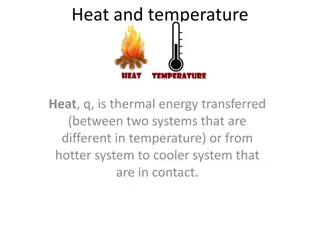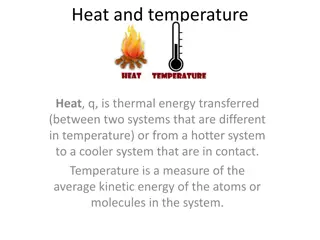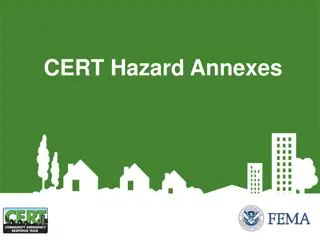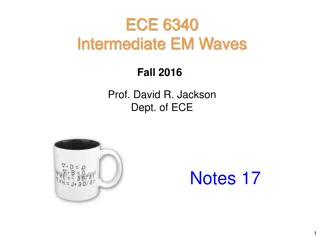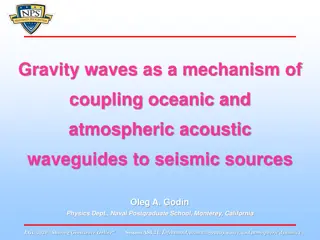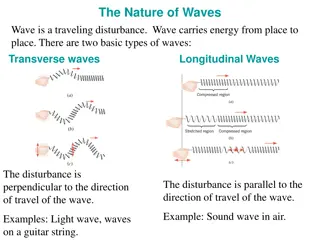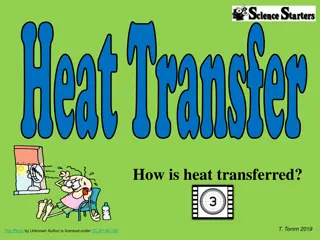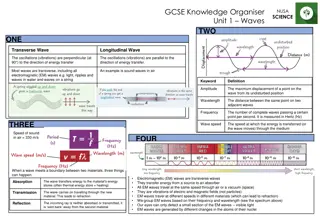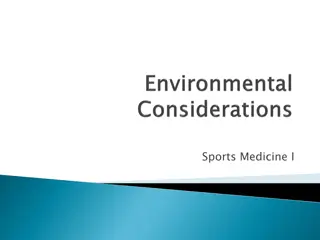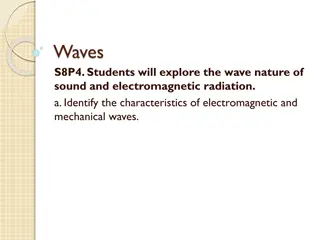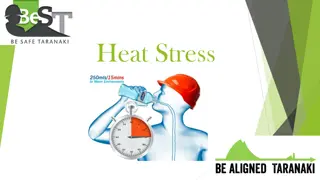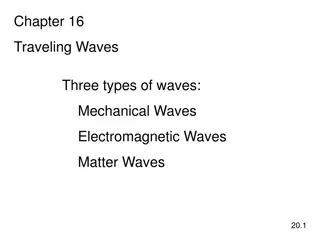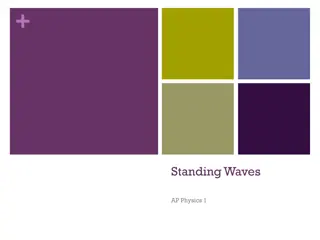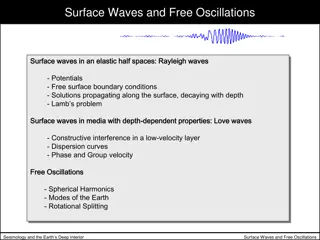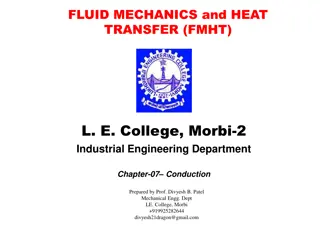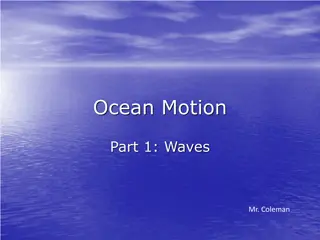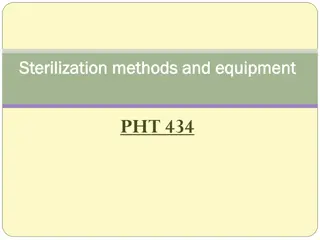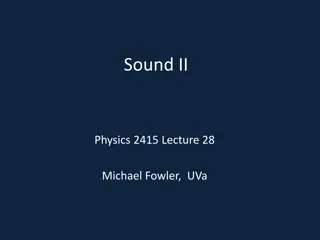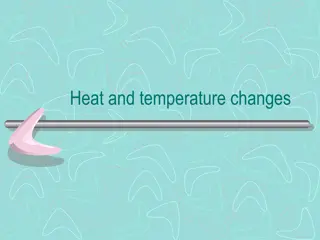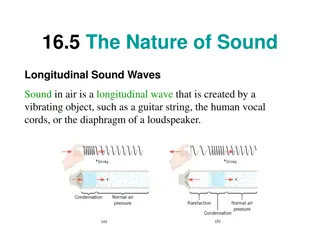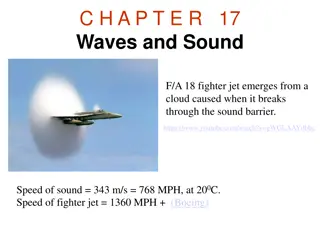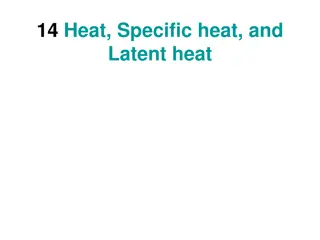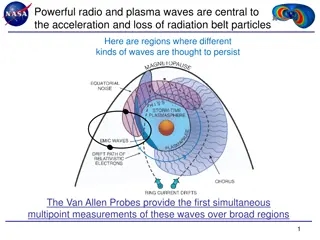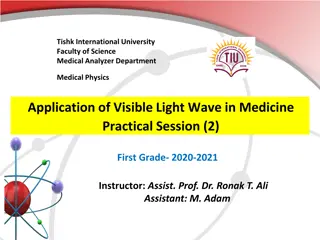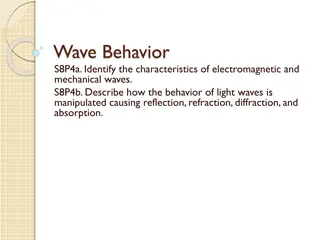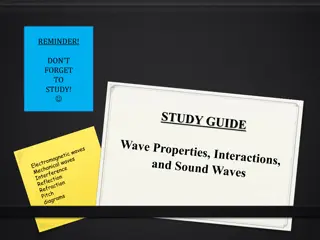commercial heat pump water heater market
Heat pump water heaters are used to move heat from the source to a sink, by utilizing electricity instead of generating heat directly. Heat pumps are used to facilitate the movement of thermal energy by absorbing heat from a cold space and release it. Further, several commercial businesses such as h
2 views • 6 slides
Understanding Earth's Interior through Seismic Waves: Part 1
Seismic waves provide crucial evidence about Earth's composition and structure. By analyzing the behavior of primary, secondary, and surface waves, scientists can determine the different layers and materials within the Earth. Primary waves travel through both solid and liquid parts, while secondary
10 views • 10 slides
Exploring Types of Waves and Energy Transport
Discover the various types of waves such as transverse, longitudinal, surface, and electromagnetic waves, along with their characteristics and applications in energy transportation. Learn about the differences between mechanical and electromagnetic waves, how waves transmit energy, and their signifi
3 views • 10 slides
Energy and Heat Transfer Problems Explained
Solve various physics problems related to heat transfer, specific heat, latent heat, and efficiency in heating devices. Calculate the amount of heat needed to raise the temperature of different substances, melt solids, and evaporate water. Explore concepts like specific heat, latent heat of fusion,
2 views • 25 slides
Insights on Outdoor Heat Exposure: OSHA Data Collection Pilot 2022
The Occupational Safety and Health Administration (OSHA) conducted a Data Collection Pilot from June to September 2022 to quantify outdoor heat exposure and assess employer heat illness prevention programs. Key findings include identifying elements of successful prevention programs, comparing workpl
0 views • 22 slides
Heat Injury Prevention and Hydration Tips for Safety at Work
Discussing the importance of heat injury prevention, this content provides valuable guidelines on recognizing heat-related issues, staying hydrated, and maintaining a safe environment in challenging weather conditions. Tips include monitoring the heat index, using heat stress thermometers, providing
1 views • 7 slides
Occupational Heat Exposure Control and Prevention Practices
Occupational Heat Exposure Control and Prevention Practices at the New Mexico Institute of Mining and Technology covers training for workers exposed to excessive heat, pre-test evaluation, objectives focusing on heat stress and exposure, understanding heat and heat stress, human body's response to h
1 views • 37 slides
Understanding Heat, Temperature, and Energy Transfer
Delve into the concepts of heat and temperature, exploring their relationship and implications in energy transfer. Discover the significance of heat capacity, specific heat capacity, and how mass influences the heating and cooling rate of substances. Learn how to calculate heat using specific heat c
3 views • 12 slides
Understanding Waves: A Visual Exploration
Explore the fascinating world of waves through visually engaging images and interactive clickers. Learn about different types of waves, including longitudinal and transverse waves, and discover what waves carry - energy, not matter. Delve into the concepts of mechanical and electromagnetic waves, an
1 views • 37 slides
Understanding Heat and Temperature in Thermodynamics
Thermal energy transfer, heat, and temperature play crucial roles in determining the behavior of systems in terms of kinetic energy and molecular motion. The zeroth law of thermodynamics establishes the relationship between heat and temperature. Heat transfer leads to changes in the average kinetic
8 views • 8 slides
Extreme Heat Preparedness and Impacts: CERT Hazard Annexes
Introduction to CERT Hazard Annexes focusing on extreme heat, discussing heat-related illnesses, impacts of extreme heat, and preparedness measures including insulation, window protection, and attic fans. The content emphasizes the preventable nature of heat-related illnesses and the vulnerabilities
0 views • 26 slides
Understanding General Plane Waves in Electromagnetic Theory
This study focuses on the analysis of general plane waves in electromagnetic theory, covering topics such as the general form of plane waves, Helmholtz equation, separation equation, wavenumber vector, Maxwell's equations for plane waves, and the symbolic representation of plane waves. The content d
0 views • 41 slides
Understanding Interference and Beats in Waves
Explore the fascinating phenomena of interference and beats in waves, where overlapping waves interact to create patterns of constructive and destructive interference. Witness how sound waves can also produce beats when interfering in time, resulting in a slow envelope effect. Delve into the princip
0 views • 40 slides
Understanding Heat Pumps and Their Efficiency
Heat pumps are essential in modern environmental technologies, transferring heat from one area to another efficiently. They work on a refrigeration cycle principle, converting low-temperature heat to higher temperatures. The heat pump system's efficiency is measured by the Coefficient of Performance
0 views • 124 slides
Understanding Heat Transfer in Science
Investigate and understand the movement of heat between objects through conduction, convection, and radiation. Learn to compare materials that conduct heat with insulating materials, describe heat transfer processes, and design experiments to study heat energy movement. Explore the use of ratio reas
0 views • 31 slides
Gravity Waves as a Mechanism of Coupling Oceanic and Atmospheric Acoustic Waveguides to Seismic Sources
Direct excitation of acoustic normal modes in horizontally stratified oceanic waveguides is negligible for shallow earthquakes due to velocity disparities. This study evaluates the contribution of scattering by hydrodynamic waves in generating abyssal T-waves. The research explores the role of scatt
1 views • 6 slides
Exploring the Nature of Waves and Sound
Understanding the nature of waves, both transverse and longitudinal, and their properties such as amplitude, wavelength, and frequency. Delve into the world of water waves, periodic waves, and the speed of waves on a string. Learn about the longitudinal nature of sound waves, the audible frequency r
0 views • 16 slides
Understanding Heat Transfer Mechanisms
Heat transfer is a fundamental concept in physics, involving the movement of thermal energy between objects. This interactive content explores different types of heat transfer such as conduction, convection, and radiation. It discusses how heat is measured, the properties of various materials in con
0 views • 4 slides
Understanding Waves: Properties, Behaviors, and Applications
Waves come in different forms - transverse and longitudinal - each with distinct characteristics and behaviors. Understanding concepts like amplitude, wavelength, frequency, and wave speed is crucial in grasping how waves transfer energy through different materials. The interaction of waves with bou
0 views • 9 slides
Understanding Heat-Related Illnesses in Sports Medicine
Hyperthermia is a condition where body temperature is elevated, posing risks like heat stress and heat-related illnesses. Proper knowledge of factors like temperature, humidity, and hydration is crucial for athletes and coaches to prevent such conditions during workouts. Metabolic heat production, c
1 views • 29 slides
Understanding Waves: Characteristics and Types Explained
Explore the wave nature of sound and electromagnetic radiation, distinguishing between electromagnetic and mechanical waves. Waves are energy-carrying disturbances that do not transport matter. Mechanical waves require a medium for energy transfer, while electromagnetic waves can travel through spac
0 views • 26 slides
Understanding Heat Stress and Prevention Techniques
Heat stress can lead to various heat-related illnesses and affect concentration at work. It's essential to be hydrated, wear appropriate gear, and monitor symptoms to prevent heat-related issues. Factors like hydration levels, environmental conditions, and personal health play a crucial role in mana
0 views • 11 slides
Understanding Traveling Waves: Types, Properties, and Equations
Explore the world of traveling waves, including mechanical, electromagnetic, and matter waves. Learn about transverse and longitudinal wave motion, the speed of waves in strings, wave frequency, wavelength, and speed relationships, as well as wave equations for non-repeating waves over space and tim
1 views • 30 slides
Understanding Standing Waves in Physics
Standing waves in physics are periodic waves that result from the interference of reflected and inverted waves, creating nodes and antinodes along a medium. These standing wave patterns can be observed in vibrating strings, such as guitar strings, where specific frequencies produce distinct harmonic
0 views • 29 slides
Surface Waves and Free Oscillations in Seismology
Exploring surface waves, potentials, and free oscillations in seismology with a focus on Rayleigh waves, Love waves, and wave equations. Understand the dispersion relation, geometry, and solutions for waves propagating in elastic half spaces and media with depth-dependent properties.
0 views • 55 slides
Understanding Heat Transfer: Conduction, Convection, and Radiation
Heat transfer is a fundamental process that occurs through conduction, convection, and radiation. Conduction involves the transfer of heat between particles through direct contact, while convection moves heat within fluids and gases through currents. Radiation is heat transfer through electromagneti
0 views • 13 slides
Understanding Ocean Waves and Their Dynamics
Exploring the science behind ocean waves, this resource delves into why waves occur, the components of a wave, how water moves within a wave, and the effects of waves hitting a beach. From defining waves to discussing wave characteristics, this content provides valuable insights into the fascinating
0 views • 13 slides
Understanding Sterilization Methods and Equipment for Pharmaceutical Products
Sterilization is crucial in the production of sterile pharmaceuticals, involving the removal or destruction of microorganisms to ensure product safety. Methods include physical (moist heat, dry heat, irradiation), chemical (gaseous, liquid sterilants), and non-thermal techniques like ethylene oxide
0 views • 35 slides
Workplace Heat Safety Tips and Warning Signs
Learn about workplace heat safety measures to prevent heat-related illnesses. Understand how the body regulates temperature, signs of heat stress, and steps to take in case of heat-related emergencies. Stay informed and prepared to ensure a safe working environment during heat waves.
0 views • 15 slides
Understanding Sound Waves: Harmonic Vibrations and Longitudinal Waves
Exploring the concepts of harmonic string vibrations in musical instruments, longitudinal waves in pipes, boundary conditions at pipe open ends, and the wave equation for waves in two and three dimensions. Topics include interference, Doppler effect, and wavelength calculations for standing harmonic
0 views • 19 slides
Understanding Radiation in Heat Transfer for Grade 7 Natural Sciences
Exploring the concept of radiation in heat transfer for Grade 7 Natural Sciences, this content delves into how electromagnetic waves carry heat and light energy. It highlights the difference between radiation, conduction, and convection, emphasizing that radiation transfers heat energy through waves
0 views • 10 slides
Understanding Heat and Temperature Changes in Chemistry
Heat and temperature changes in chemistry are crucial concepts to comprehend. Heat capacity, molar heat capacity, and specific heat capacity play significant roles in determining temperature changes when heat energy is added or removed. Different substances have varying abilities to absorb heat, aff
0 views • 17 slides
Understanding Sound Waves: Nature, Properties, and Characteristics
Sound waves are longitudinal waves created by vibrating objects in air. They cannot propagate in a vacuum. Understanding how we hear involves exploring wave representations and the frequency ranges of sound waves, from infrasonic to ultrasonic. Sound also exhibits objective and subjective properties
0 views • 12 slides
Understanding Waves and Sound: A Visual Exploration
Explore the nature of waves and sound through a visual journey covering topics like transverse waves, longitudinal waves, water waves, periodic waves, wave speed, the speed of a wave on a string, the nature of sound, and the frequency of sound waves. Discover how waves carry energy, the different ty
1 views • 32 slides
Understanding Heat, Specific Heat, and Latent Heat
Heat is energy transferred between objects due to temperature difference. Specific heat capacity measures the amount of heat needed to change the temperature of a substance. Latent heat is the energy required for a phase change without a temperature change. Calorimetry and measuring specific heat ar
0 views • 14 slides
Understanding Heat Transfer: A Comprehensive Overview
Heat transfer is a fundamental concept in physics, where energy moves from hot to cold objects through conduction, radiation, and convection. Heat is not a substance but a form of energy that speeds up molecules. Conduction transfers heat between substances in direct contact, while convection involv
0 views • 13 slides
Unveiling the Role of Radio and Plasma Waves in Particle Acceleration
Radio and plasma waves play a crucial role in the acceleration and loss of radiation belt particles. The Van Allen Probes provide groundbreaking multipoint measurements of these waves in various regions, shedding light on phenomena such as chorus waves and resonant wave acceleration. Strong correlat
0 views • 8 slides
Understanding Visible Light Waves in Medicine and Physics
Visible light waves play a crucial role in medicine and physics, where they are the only electromagnetic waves that humans can see. These waves create the colors of the rainbow with varying wavelengths, allowing us to perceive different colors and forms of light. Understanding the properties of visi
0 views • 22 slides
Understanding Light Wave Behavior: Reflection and Refraction
Explore the characteristics of electromagnetic and mechanical waves along with how light waves can be manipulated through reflection and refraction. Discover how reflection occurs when waves bounce off surfaces and how refraction bends waves as they move between different mediums, affecting their sp
0 views • 18 slides
Understanding Waves: Definitions and Characteristics
This educational content covers definitions and characteristics of waves, including transverse and longitudinal waves, how waves travel through a medium, interference, earthquake waves, sound properties like amplitude and pitch, the Doppler Effect, and differences between reflection and refraction.
0 views • 10 slides







